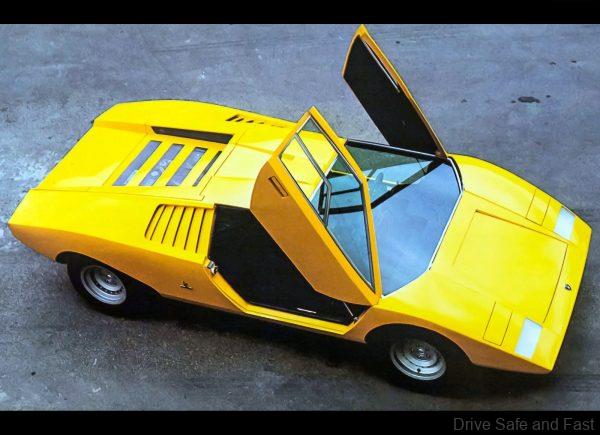Half a century has passed since the Lamborghini Countach first appeared!
As rare as supercars are, nowadays, they seem to be popping up like mushrooms. Just about every car brand with a hint of a performance history has one. Loads of startups without any brand value have built supercars. Very few have a lasting impression, and that’s perhaps the biggest reason why a supercar should be built in the first place. That’s definitely what Lamborghini got right with the Countach back in the 1970s.
This was a shape and style that was ahead of its time and it’s undoubtably an icon of automotive history to this day.

It’s hard to believe that the first time the Lamborghini Countach LP 500 first debuted was exactly half a century ago. The car that was shown at the Geneva Motor Show in 1971 was a concept, with the production run only beginning in 1974. Less than 2,000 units were ever made. Here’s the press release with the abridged history of the Lamborghini Countach.
PRESS RELEASE
Exactly 50 years ago at the Geneva Motor Show, the undisputed star of the event was introduced: the Lamborghini Countach LP 500 in yellow. At ten o’clock in the morning in the exhibition space of Carrozzeria Bertone, this prototype made its first public appearance. Its unveil was so successful that the company raced against time to satisfy the customers’ requests and transform the futuristic show car into a production car, though in a small series. The decision to unveil the Countach LP 500 in Carrozzeria Bertone’s space was motivated by the fact that Lamborghini’s stand featured the latest arrival of the House of the Raging Bull: the Miura SV, perfected after five years of production. With this double presentation, Lamborghini communicated and confirmed its prowess not only in production but especially in innovation, to the extent that in the months following Geneva, the Countach LP 500 was featured in all the international automotive magazines.
The Countach project, with internal code number LP112, where LP indicates the rear longitudinal position (“Longitudinale Posteriore” in Italian) of the 12-cylinder engine, stemmed from Ferruccio Lamborghini’s desire to maintain the image of a company at the forefront of style and technology following the Miura.
Heading up this record-breaking achievement was engineer Paolo Stanzani, who had been with Lamborghini since 1963, and in 1968 was named General Manager and Technical Director, responsible for the mechanical part of the Countach.
The beautiful, clean, futuristic lines of the Countach, still so after 50 years, were styled by Marcello Gandini, Design Director of Carrozzeria Bertone. Gandini was also responsible for the decision to use the scissor doors, which since that time have characterized the production of Lamborghini’s 12-cylinder models. The LP 500 was a substantially different car than the Countach that would go into production in 1974. It had a platform frame rather than a tubular one, it was equipped with a 12-cylinder 4971cc engine (one of a kind), the engine air intakes had a shark gill design, and inside it featured sophisticated electronic instrumentation.
The origin of the name of this car lies in the dialect of the Piedmont region. In its final stages of assembly, the car was hidden in a shed for agricultural machinery on a farm near Grugliasco (province of Turin) to avoid possible work stoppages related to labor unrest, and was “discovered” by a farmer who exclaimed in amazement and enthusiasm, “Countach!” (a word in Piedmontese dialect expressing wonderment). When Piedmont-born Marcello Gandini became aware of the fact, he thought that this word had a particularly strong communicative force and also convinced Nuccio Bertone, Ferruccio Lamborghini and his colleague Paolo Stanzani of this.
Following the LP 500’s success in Geneva, Lamborghini’s chief test driver Bob Wallace used the car, equipped with a more reliable 4-liter engine, for every possible kind of road test. The career of this extraordinary car ended at the beginning of 1974, when it was used for the crash tests required for the homologation of the production car and subsequently scrapped.
From 1974 to 1990, 1,999 Countachs in five different series were produced, representing a model that, in addition to ending up displayed on the bedroom walls of an entire generation and being used in dozens of films, allowed Lamborghini to survive the most difficult years of its history and to enter permanently into the halls of legend.




